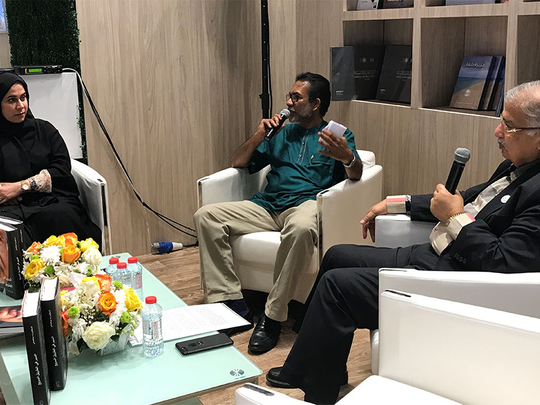
Abu Dhabi: He was 18 when he landed in Dubai in November 1959 by a ship from Mumbai [then Bombay] and he was surprised to see that Emiratis were widely using Hindi and Indian rupee.
“They did not let us learn Arabic. When I tried to pick up some Arabic and asked them something in Arabic, they used to reply in Hindi,” said Dr Ram Buxani, the author of the book ‘Taking the High Road’, at an event at Abu Dhabi International Book Fair on Friday evening.
There was no electricity and running water in those days and donkeys used to carry water cans. “We used to find flies and cockroaches in water. We had to clean and boil it before drinking,” Buxani said at a panel discussion organised by the National Media Council (NMC) at its pavilion in the book fair.
The interaction with Buxani delved deep into the UAE’s past and connected it to its dynamic present through the eyes of an expatriate Indian who made Dubai his home for almost 60 years.
There was no airport but a small airfield of Royal Air Force. Most of the goods to Dubai came by ships or big boats. As Dubai Creek was not so deep those days, boats used to get stuck in the creek during low tide at night.
The Dubai Ruler’s decision to dredge and deepen the creek was a historic move that helped develop trade manifold in the 1960s. The project cost Rs300,000 and it was carried out also with the support of businessmen, said Buxani who is the chairman of ITL Cosmos Group.
If you change with the change, you can survive but if you cause the change you can lead. “The rulers of this nation have always been causing the [positive] change and that’s why this country has been leading the region in many sectors,” he explained.
About the relationship between Emiratis and Indians in old days, Buxani said there was no competition at all, there was only collaboration. Locals never showed any superiority to foreigners, he said in reply to a question from Shajahan Madampat, a media adviser to the NMC, who moderated the discussion.
It was an exciting and inspiring experience to witness the growth of Dubai that became home to people from more than 200 nations across the world, Buxani said.
“Every day of my life in Dubai was exciting!”
Buxani’s autobiography ‘Taking the High Road’ narrates his six-decade-long life in the UAE as well as the strong bilateral relations between the UAE and India.
Ebrahim Al Abed, an adviser at the NMC, said when Shaikh Zayed Bin Sultan Al Nahyan visited India during 1970s, he told the Indian media that Emiratis and Indians were friends before the discovery of oil.
Professor Zikrur Rahman, former Indian Ambassador to Palestine, said when oil supply was limited during Israel-Palestine war in 1973 and the first Gulf War in 1990-91, the UAE Rulers had assured India uninterrupted supply. “I don’t think there is a relationship like the one between Indian and the UAE … between any other countries in the world,” Rahman said.


